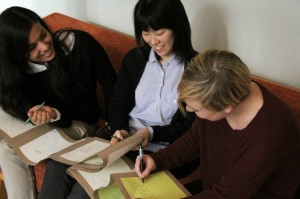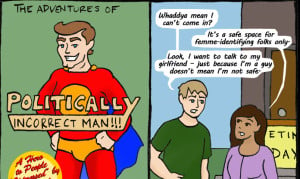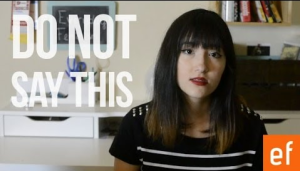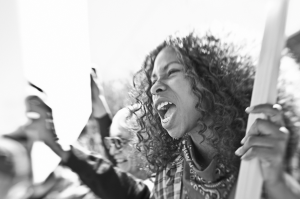
Source: Sana Rao
“Psst… Hey, Patty! You speak Spanish? Ignoring me? Hey! You speak Spanish?”
P.E., third period, seventh grade.
Every time Ricardo saw me, he would ask me the same question.
At first, I would answer yes, but he would always get me back with a “Nah, prove it. Say something.” I never did.
I would often imagine myself yelling, “¡Que sí, güey! ¿Ya cuántas veces te tengo que decir, pues? Pinche metiche,” but in reality, my face would blush and my hands would sweat in frustration such so that I’d slip while trying to do a pushup.
I stopped talking to most kids at school when I moved to a new district at five (also when I was given a “new” name by my white teacher who pronounced it wrong; I didn’t have the voice to correct anyone until two years ago), and I didn’t really start again until high school. I wasn’t going to open up for Ricardo.
But Ricardo wasn’t the first person to demand proof, to demand to know why my last name and my appearance didn’t make sense to them (“Pues, es que mi familia es de Nayarit y Jalisco.” “Aaah, bueno, por eso.”), and he wouldn’t be the last.
Folks around town knew my dad as el güero (a nickname rooted in the fact that he has light skin, but also in fondness, como de cariño), but kids at school and church, who knew I was Mexican, called me white girl (zero cariño). I took offense.
Growing up in a largely Mexican immigrant town, my conception of white people and the lives they led was based almost entirely off of television.
According to TV, white kids had just one or two siblings, they went on family vacations, and they had “full course meals.”
My food, my family, my virgencita, my language, mi México lindo y querido were all absent. I felt that by calling me white, those kids were denying my cultural experience and denying my right to self-identify. So it pissed me off.
But I was wrong. Or rather, misguided.
The liberal arts college I attend is an elite institution, painfully far from home, but with a good need-based financial aid package that keeps trying to convince me that I made the right choice in going.
I’ve struggled a lot there.
I’ve felt unintelligent, as though my kind of knowledge was not valuable, as though something was wrong with me because I couldn’t read or “think critically” like the other students. I’ve felt alone, unsupported.
But when a series of events unfolded across my campus, and many minority students stood up and demanded support and accountability for microaggressions (and many aggressions that were really systemic in nature), I realized that I was not alone, but also that I was separate.
Many of my peers were exhausted. It was clear that this was a battle, in defense of their humanity and worth, that they had been waging their whole lives. Of course, they were fearless and strong nonetheless, but I could see that theirs was an experience I simply could not know.
I pass for white, easily.
And regardless of how I was raised or how I see myself, that has made a difference. When I went to get enrolled in my new elementary school, I was told by the older woman leaning over her desk to make eye-contact with me that I was going to be put on A-track “with all the other smart kids.”
She didn’t know me. My mom didn’t speak English, and I certainly didn’t say a word to her. There were few white kids at my school, and they were all on A-track.
White privilege encompasses many things that I do not and cannot benefit from, but I do benefit from a lot and it’s very important that I recognize it.
To name just a few of those benefits: the quality of my English is never going to be commented on in a first encounter, I see people who at least look kind of like me represented in the media all the time, and I will probably never have to worry about being followed for “suspicious behavior” in a convenience store.
I can’t claim to know what it’s like to be immediately cast as the other, as threatening and undeserving.
Beyond where the color of my skin places me within US racist/colorist society, I also need to be cognizant of what of my Mexican herencia I present, both as a white presenting person in the United States and a light-skinned person in Mexico.
The Spanish word herencia means both heritage in the sense of where we come from and inheritance in the sense of what is passed down. So while it is true that my Mamá Nina was a mujer indígena, it is also true that she was kidnapped by my mestizo great-uncles to marry my Papá Nel.
Her cultural experience has been erased in my family’s history such so that no one knows anything about the life she led before she was taken. There is an inherent whitening that comes with mestizaje, and with whitening, erasure.
I am often bothered by the sight of a white girl with a “traditional Mexican style” purse or backpack, but at the same time I probably know just as little about the significance of those particular patterns decorating the items.
So then, what does it mean for me to sport them, simply because I grew up surrounded by them, when I look very much like those girls whose comfort with cultural appropriation upsets me so?
As a white/light-skinned person, I feel that I have a responsibility to present an alternative to an identity that bases itself on taking what isn’t theirs. With my sweet mami by my side, I have found comfort in my Chicana identity, in returning to the world of experiences that I know and questioning those aspects which my newer experiences have complicated.
I have been invited by friends (and other people who simply read my name on a list and made assumptions) to Women of Color Luncheons and closed groups, but I’ve never gone because Person of Color is an identity I’ve struggled to pick up and I decided that, for me, I simply can’t.
I feel that my responsibility is in allyship work, in the role of ally to POC (as I am, for example, in the work against ableism, trans*phobia, and for the rights of those folks who are undocumented) because I look white and I can in no way claim a POC experience.
It doesn’t matter that all my primos on this side of the family can or that my grandparents and great grandparents could. I feel like I can’t.
Soy queer chicana, sin dinero, but I am not visibly non-white and sometimes (a lot of the time), I’ve got to work in support to ensure that other voices get heard.
The struggle against the white capitalist patriarchy does not involve a competition to see who is the most oppressed, but rather it should offer an invitation for everyone to see where they are privileged where others are not and to adjust their behaviors accordingly.
To other white-presenting folks out there, be careful.
They’re going to want to use us for nasty things like silencing cries against the erasure of bodies of color in the mainstream media (“But [green-eyed, light-skinned Latino] is Hispanic! We’re not racist”) or other such bullshit, but we can point out the bullshit and say no.
We must be responsible.
We must not be afraid to check our privilege and use it when we know we will be heard, and that our friends and family are tired. Because we love them, we cannot stay silent or immobile.
[do_widget id=”text-101″]
Pati Gutiérrez-Fregoso is a Latin American Studies Major and Film and Media Studies Minor at Swarthmore College in Pennsylvania. She enjoys writing stories/drawing comics about identity, family, and movement. She’s a feminist Chicana, occasional writer, and she probably thinks about babies and motherhood far too often and far too seriously.
Search our 3000+ articles!
Read our articles about:
Our online racial justice training
Used by hundreds of universities, non-profits, and businesses.
Click to learn more




















